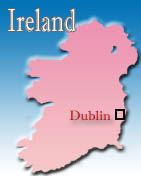Irish concerns about abortion, neutrality may scupper Lisbon again
 Dublin - With Ireland's Prime Minister Brian Cowen expected to tell a summit in Brussels later Thursday that he will hold a second referendum on the European Union's Lisbon Treaty by October 2009, Ireland's naysayers are regrouping for the second battle of Lisbon.
Dublin - With Ireland's Prime Minister Brian Cowen expected to tell a summit in Brussels later Thursday that he will hold a second referendum on the European Union's Lisbon Treaty by October 2009, Ireland's naysayers are regrouping for the second battle of Lisbon.
"We are seeking legal guarantees on the concerns that the Irish people have," Foreign Minister Micheal Martin said Thursday in an attempt to reassure a sceptical electorate.
First out of the traps was Padraig MacLochlainn, representing Sinn Fein, which has four seats in the Irish parliament and was the only parliamentary party to campaign against the treaty in June's referendum.
He described "declarations on abortion, workers rights, and provisions of public services" as not being "worth the paper they're written on."
Although Martin dismissed Sinn Fein's response as a "knee-jerk no reaction," there are real concerns amongst Irish people that the proposed declarations would not guarantee the primacy of the Irish constitution on neutrality and abortion.
Although abortion is not addressed by the Lisbon Treaty, Irish pro-life groups such as Coir engaged in an extensive leafletting and poster campaign in advance of June's referendum, suggesting that ratification of the treaty would lead to legalization of abortion.
Ireland's constitution safeguards the rights of the unborn child and the country maintains a ban on abortion.
The country's right to retain its constitutional safeguards with regard to the unborn has been enshrined in a protocol to the EU's Maastricht Treaty of 1992.
However, Coir claims that if the Lisbon Treaty were ratified incorporation of the European Union's Charter of Fundamental Rights could lead to the loss of Irish sovereignty on issues such as abortion and euthanasia.
Pro-life campaigners maintain that a European human rights charter would be interpreted liberally by the European Court of Justice to grant abortion rights on demand.
"Where such an important issue as abortion is concerned, the Lisbon treaty could take the decision away from the people of Ireland and give it to an unelected, unrepresentative, and largely anti-life bench of EU court judges to decide the fate of our unborn children," Coir warned in a statement released prior to June's referendum.
"Not only our abortion laws but our laws protecting marriage and the family could be overruled by the European Court of Justice if Lisbon was passed."
Martin strongly rejected Coir's contentions as "outrageous claims" and stressed that the treaty would provide Ireland with "absolute control with regard to the protection of the unborn."
However, in the absence of any real information about and knowledge of the treaty, the fears voiced by Richard Greene, Coir spokesman, that the rights section of the Irish constitution would be replaced by the Charter of Fundamental Rights and that the European Court of Justice would replace Ireland's Supreme Court took root.
Conservative Catholics feared that a yes vote for Lisbon would be in conflict with their conscience. Another matter of conscience that has raised concern is military neutrality.
The anti-Lisbon argument with regard to EU military policy revolves around fears of Ireland's neutrality being compromised by a common defence policy.
"I will campaign as vigorously as I can against this treaty unless we get an opt-out from participation in the military objectives of the European armaments group, the European Defence Agency," says Senator David Norris, who is due to give a oration for the Lisbon Treaty at a mock funeral to be held in Dublin Thursday evening.
"We argue that it is unconstitutional for the government and illegal to put the same question to the people again. We need a referendum to change our constitution and we had the Lisbon referendum. We think that there would be a legal case to be brought against them if they attempt to do so," says the Roger Cole, Chairman of the Irish Peace and Neutrality Alliance (PANA), which is organizing the funeral.
The Lisbon Treaty aimed to streamline decision-making in the 27-nation bloc, cannot enter force until all member states have ratified it.
Ireland and the Czech Republic are the only countries not to have ratified it. Germany has not completed the ratification process, but is expected to soon.
The current French presidency of the EU wants an agreement that Lisbon Treaty should come into force by 2010. (dpa)